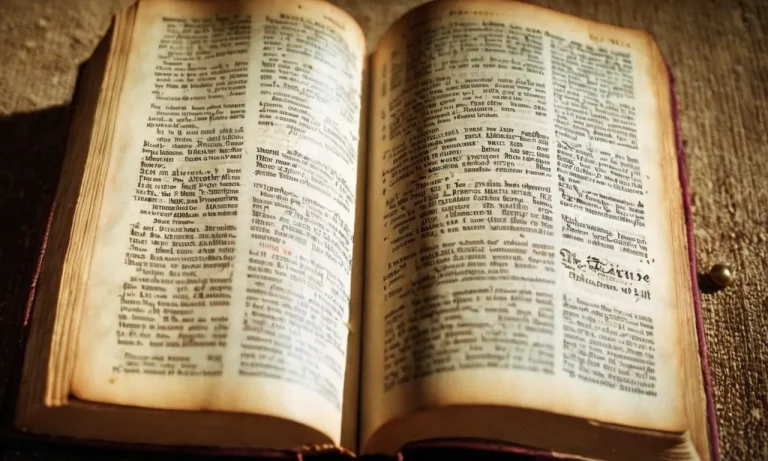Exploring Free Will And God’S Sovereignty
The question of how we can have free will if God is in control has puzzled thinkers for centuries. If God knows and determines everything that will happen, how can humans make free choices? This age-old question touches on the very nature of free will, predestination, and God’s omniscience.
If you’re short on time, here’s a quick answer to your question: Humans can have free will even with God’s omniscience and sovereignty, through God’s granting of libertarian free will and His existence outside of time. But let’s dive deeper into the details…
In this comprehensive article, we’ll define key terms like free will, determinism, and God’s sovereignty. We’ll outline the main philosophical positions on this debate. And we’ll examine Biblical evidence and theological perspectives on how God’s control and human free will can coexist.
Defining Key Terms
Free Will
Free will is the ability to make choices freely, without external constraints or predetermined outcomes. It suggests that humans have the capacity to make decisions and take actions independent of forces beyond their control.
Philosophers have long debated whether free will truly exists or if our actions are determined ahead of time. Those who believe in free will say that we are moral agents responsible for our choices. But determinists argue that all events, including human actions, are the inevitable result of preceding events according to natural laws.
Determinism
Determinism is the philosophical view that all events, including human actions and choices, are completely determined by previously existing causes. Determinists believe that the universe operates according to fixed natural laws, so every event has a preceding cause that made it inevitable.
They argue that since our choices are influenced by factors like our biology, environment, and past experiences, free will is just an illusion. Hard determinists say free will cannot exist at all in a deterministic universe.
But compatibilists believe some form of free will is still possible despite determinism being true.
God’s Sovereignty and Omniscience
In Christian theology, God’s sovereignty refers to His complete power and control over all things. This suggests that everything happens according to His divine will and nothing occurs outside of His foreknowledge.
God’s omniscience implies that He has total knowledge of the past, present, and future. Some Christians believe human free will would contradict God’s sovereignty and omniscience. If humans can make free choices, it would mean God does not have complete control.
Conversely, if God is sovereign, human free will may be an illusion since our actions are predestined. Others argue that God, in His omniscience, gave humans free will while still maintaining overall sovereignty in alignment with His divine plan for creation.
Philosophical Positions on Free Will
Theological Determinism
Theological determinism is the view that God has determined all events ahead of time. This means that humans do not truly have free will or make free choices. According to this view, God is completely sovereign over everything that happens, including human actions and decisions.
Key proponents of theological determinism include John Calvin, Jonathan Edwards, and Paul Helm.
Theological determinists argue that if humans had libertarian free will, it would undermine God’s sovereignty. They claim that God’s omniscience of future events implies that the future is already determined. However, critics argue that this confuse God’s knowledge with control.
Just because God knows what will happen does not mean he directly causes it to happen. Most who hold this view appeal to mystery in trying to reconcile human free will with divine sovereignty.
Libertarian Free Will
In contrast to theological determinism, libertarian free will is the view that human free will is not compatible with determinism. Humans have the ability to make genuine choices between different possible courses of actions, unconstrained by factors like God’s sovereignty, fate, or causal determinism.
Advocates of libertarian free will argue that it is necessary for moral responsibility. If humans cannot make free choices, they cannot truly be held accountable for their actions. Libertarian free will generally holds that God does not directly cause human decisions, although he may influence them.
This allows for divine sovereignty and human free will to coexist.
Molinism
Molinism aims to find middle ground between theological determinism and libertarian free will. Named after 16th century Jesuit priest Luis de Molina, molinism argues that God has middle knowledge (scientia media) of what humans would freely choose to do in any set of circumstances.
Using this knowledge, God actualizes the world in which humans freely make the decisions he knows they would make.
So in molinism, humans have libertarian free will and make genuine choices without God directly causing their decisions. Yet God places them in circumstances where he knows what they would freely do ahead of time. So God remains sovereign without undermining free will.
Molinism affirms both human libertarian freedom and divine providence.
Evidence from Scripture
Verses on God’s Sovereignty
There are many verses throughout the Bible that point to God’s supreme authority and control over all things. A few examples include:
- Isaiah 46:10 – “I make known the end from the beginning, from ancient times, what is still to come. I say, ‘My purpose will stand, and I will do all that I please.'”
- Daniel 4:35 – “All the peoples of the earth are regarded as nothing. He does as he pleases with the powers of heaven and the peoples of the earth. No one can hold back his hand or say to him: ‘What have you done?'”
- Acts 17:26 – “God determined the times set for people and the exact places where they should live.”
- Romans 9:19-21 – “One of you will say to me: ‘Then why does God still blame us? For who is able to resist his will?’ But who are you, a human being, to talk back to God? Shall what is formed say to the one who formed it, ‘Why did you make me like this?’
Does not the potter have the right to make out of the same lump of clay some pottery for special purposes and some for common use? “
These and many other verses point to God’s supreme authority and control over everything that happens, which affirms a strong view of God’s sovereignty.
Verses on Human Choice
At the same time, there are also many verses that point to human free will and choice, including:
- Deuteronomy 30:19 – “I have set before you life and death, blessings and curses. Now choose life, so that you and your children may live.”
- Joshua 24:15 – “Choose for yourselves this day whom you will serve.”
- John 7:17 – “If anyone chooses to do God’s will, he will find out whether my teaching comes from God or whether I speak on my own.”
- Revelation 3:20 – “Here I am! I stand at the door and knock. If anyone hears my voice and opens the door, I will come in and eat with that person, and they with me.”
These and other verses point to the ability of humans to make real choices that have meaning and impact. This affirms a view of human free will.
Reconciling Perspectives
So how can we reconcile God’s sovereignty with human free will? There are a few main perspectives:
- God is absolutely sovereign, but this does not eliminate meaningful human freedom and responsibility. God ordains all things, but in a way that does not violate the responsibility and significance of human choices. This view sees both concepts taught in Scripture.
- God sovereignly decreed that humans would have libertarian free will. God determined to give humans a will that is not absolutely determined by God or nature. Humans make free choices, but God knew in advance what they would be.
- God sovereignly controls big picture issues, but allows humans free will on smaller issues. Some events are determined by God, but human decisions shape events within parameters allowed by God.
- Human free will is compatible with God’s sovereignty, though we cannot fully understand how. Scripture affirms both realities, even if the mechanics are not clear. We should embrace the mystery.
There are good biblical cases for each view. Christians disagree on exactly how God’s sovereignty and human free will work together, but most affirm that the Bible teaches both theological concepts.
Theological Perspectives
Augustine and Calvin’s Views
Augustine of Hippo (354-430 AD) and John Calvin (1509-1564 AD) both advocated the view that God is completely sovereign over everything that happens, including human decisions and actions. This is known as divine determinism or predestination. According to this perspective:
- God has foreordained all events throughout history. Nothing happens outside of His sovereign will (Ephesians 1:11).
- God chose certain people to be saved through His grace, not based on any foreseen merit in them. This is called “unconditional election.”
- Those God elected cannot resist His call to salvation. They will be regenerated by the Holy Spirit and inevitably come to saving faith. This is called “irresistible grace.”
Arminianism
In contrast, Jacobus Arminius (1560-1609 AD) and his followers disagreed with some aspects of Calvinism. Their view affirms both God’s sovereignty and meaningful human free will and responsibility. Key aspects include:
- Election based on God’s foreknowledge: God chooses to save those He foresees would respond positively to the gospel.
- Prevenient grace: By the Spirit’s enabling grace, fallen humanity can choose to cooperate with God’s offer of salvation.
- Conditional perseverance: Believers have security in Christ, but can still abandon their faith through unbelief or backsliding.
In this perspective, God’s sovereignty does not negate free will. His plans encompass human decisions, but people still make real and consequential choices. Unlike Calvinism, God’s election is based on His foreknowledge of human decisions.
Open Theism
Open theism, advocated by scholars like Gregory Boyd, is a relatively new perspective. They argue that the future is partly open and unsettled. While God can predestine some events, He chooses not to predetermine others, including human decisions, to allow for genuine free will and creativity.
In open theism, God does not have exhaustive foreknowledge of future events. He may at times change His plans in response to unfolding human decisions. This view claims that complete divine foreknowledge is incompatible with libertarian free will.
Critics argue that open theism wrongly limits God’s omniscience and sovereignty over history. Proponents claim their model takes free will seriously while retaining divine foreknowledge and sovereignty over many important events.
Conclusion
In the end, the question of divine sovereignty and human free will touches on the very nature of God and mankind. While philosophical views vary, Scripture seems to present a both/and picture – affirming both God’s control and human responsibility.
The details may remain mysterious, but trust in God’s wisdom offers hope of final harmony.
This age-old question will continue to be wrestled with, but the discussion points to deep truths about our Creator and ourselves. May exploring divine mysteries lead us deeper into awe and reliance on God’s grace and truth.








